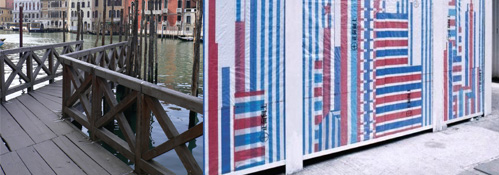Sabrina M.Y. Fung (F): Curator
Leung Ping-kwan (L) : writer, poet
| L: |
Right, let's talk about
your role as an artist, curator and arts administrator. As an
artist, how do you balance your own projects with the roles
of handling and promoting the works of others? |
| F: |
It certainly takes the romance out of it. You have to know
how to work with people. Maybe my music and art gallery backgrounds
have helped. I have learned how to work with other people and
respect their works. Adapting to the roles of a performing artist,
gallery owner, and now an art consultant has been quite comfortable
for me. |
| |
|
| L: |
When I first met you, you were performing
John Cage's ASLAP. As a musician by original profession, do
you have any regrets about becoming an art curator and administrator? |
| F: |
I don't think it was a conscious decision to quit performing.
When I returned to Hong Kong from the States, my art consulting
work was so busy that I had simply no time to perform. |
| |
|
| L: |
Ever regret making that decision? |
| F: |
You need to have a passion towards your work to enjoy the
process. No matter what you do you will enjoy it. For instance,
it's far more time-consuming and it does not pay to be a curator
instead of working as an art consultant; but, similar to giving
a performance, the end result is very rewarding. That's what
keeps me going. |
| |
|
| L: |
Have you been a pianist for a long time? |
| F: |
Oh, yes. Over twenty years. |
| |
|
| L: |
And it all began in Vienna? |
| F: |
Yes, and later I went to New York. But when I returned to
Hong Kong, my art consulting work was so overwhelming. It is
always a struggle to lead a life as an artist while earning
a living. It's very hard for these two pursuits to co-exist.
In New York, there was time to work as a performing artist while
managing an art gallery, but in Hong Kong, its work, work, and
more work. You simply can't get any time off. It also seems
that people in Hong Kong or Asia won't take you seriously if
you are working in two different disciplines at the same time.
It's a different aesthetic environment in Asia than in New York
where people can be involved in very different types of work
at the same time. |
| |
|
| L: |
When you work in a gallery or a curate
a show for museums, the roles are very different than as a performer.
|
| F: |
Indeed, it's mostly the role of coordinating, and it requires
one to think objectively not subjectively. |
| |
|
| L: |
Where do you get funding for your exhibitions? |
| F: |
As a curator, I finance exhibitions with my own funds and
sometimes with the support of sponsors. These are all non-profit
projects and we don't make any money from them. |
| |
|
| L: |
Are there projects you hope to do but
can't because of the lack of necessary funding and other restrictions? |
| F: |
I would love to organise public art projects that bring exciting
and dynamic works to Hong Kong. One possibility is to invite
international artists to create site specific works for public
spaces. Contemporary art is rare in public spaces in Hong Kong.
Even though Art is a much discussed topic here in recent months,
public art is still very limited in Hong Kong. Let's hope we
can help improve this situation! |
| |
|
| |
Leung Ping-kwan is a poet born and raised in Hong Kong.
He has published more than ten volumes of poems, including bilingual
editions such as: City at the End of Time (1982), and the more
recent one: Travelling with a Bitter Melon (2002). His poems
and collections of novels have been translated into English,
German, French and Japanese. He teaches literature and film
studies at Lingnan University and has published critical works
such as Books and Cities (1985) and Hong Kong Culture (1995).
His most recent work, Hong Kong in the Eyes of Leung Ping-kwan
(Hong Kong in the Eyes of Ya Si), is a selection of his essays
and photos about Hong Kong. He has collaborated with various
visual and performing artists, including "East West Matters"
at the Museum for Applied Art at Frankfurt and at "Raum"
Studio, Bern. |




